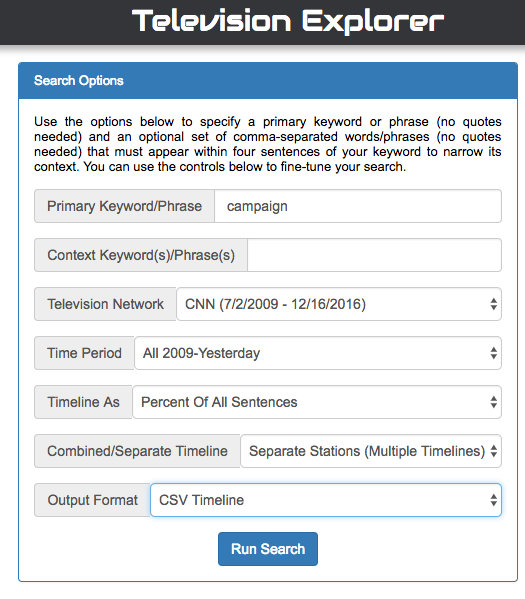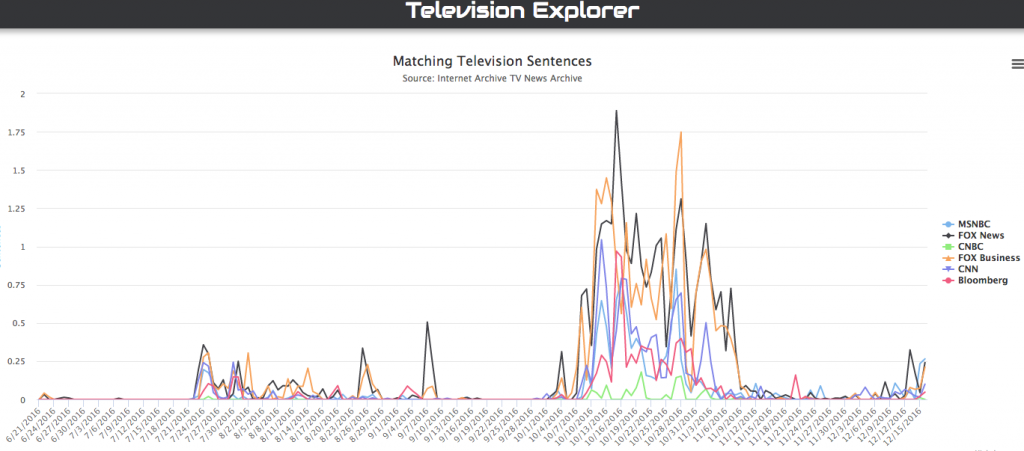A weekly round up on what’s happening and what we’re seeing at the TV News Archive by Katie Dahl and Nancy Watzman. Additional research by Robin Chin.
This week we look at how different cable networks explained newly inflamed U.S.-North Korea tensions. Which channel seemed to repeat a particular phrase, like “fire and fury” the most in the last few days? What did fact-checking partners have to report on President Donald’s Trump’s tweeted threat against North Korea? Plus: a Vox analysis of Fox based on TV News Archive closed captioning data.
“Fire and fury” popular on CNN
Over a 72-hour-period, CNN mentioned President Donald Trump’s “fire and fury” threat against North Korea more than other major cable networks, according to a search on the Television Explorer, a tool created by data scientist Kalev Leetaru and powered by TV News Archive data.
Morning show reactions day after “fire and fury” statement
While a Fox & Friends host Brian Kilmeade said President Trump was “right on target” with his threat against North Korea, a Fox Business Network morning show hosted Center for National Interest’s Harry Kazianis who blamed former President Barack Obama for the current U.S.-North Korea tensions. Meanwhile, host Lauren Simonetti and showed viewers a map of potential trajectories of missiles from North Korea to the continental U.S., saying “you can see they have the ability to strike major cities, including New York City and Washington, D.C..”
On a BBC morning show, the PC Agency CEO Paul Charles said President Trump “is talking like a dictator himself to some extent,” and offered his opinion on the geopolitical context, saying “it’s in their [China’s] own interest to try and find some territorial gain in the region, so I’m not convinced China can the answer.”
C-SPAN aired footage of an interview with Secretary of State Rex Tillerson in which he said “I do not believe there is any imminent threat” and that though he was on his way to Guam which North Korea said it was targeting, he “never considered rerouting.”
A CNN morning show had a panel of guests from all over the world, giving them an opportunity to share perspectives from those locations, including CNN international correspondent Will Ripley reporting from Beijing that there is “increasing concern that an accidental war could break out on the Korean Peninsula,” CNN international correspondent Alexandria Fields reporting that people in South Korea “know that a war of words can lead to a mistake and that’s the fear; that’s the fear and that’s what can cause conflict… You’ve got more than 20 million people in the wider Seoul metropolitan area.” CNN military and diplomatic analyst Rear Admiral John Kirby offered his perspective that “when the president reacts the way he does, he reinforces Kim’s propaganda that it is about the United States and regime change. He’s actually working to isolate us rather than North Korea from the international community.”
Vox on Fox; used TV News Archive data used to reveal shift in “Fox & Friends”
Vox reporter Alvin Chang used closed captioning data of “Fox & Friends” from the TV News Archive for his analysis showing that “the program is in something of a feedback loop with the president.” He spoke about his work on CNN, saying hosts of the Fox show “seem to know that the president is listening” and “instruct or advise the president, and they’ve done it increasingly more since his election.”
Fact-check: US nuclear arsenal now stronger than ever before because of the president’s actions (false)
On Wednesday, President Trump tweeted, “My first order as president was to renovate and modernize our nuclear arsenal. It is now far stronger and more powerful than ever before.”
“False,” reported PolitiFact’s Louis Jacobson, writing, “[T]his wasn’t Trump’s first order as president” and his executive order was “not unusual.” He quoted Harvard nuclear-policy expert, Matthew Bunn: “There is a total of nothing that has changed substantially about the U.S. nuclear arsenal over the few months that Trump has been in office. We have the same missiles and bombers, with the same nuclear weapons, that we had before.”
Over at FactCheck.org, Eugene Kiely quoted Hans M. Kristensen, director of the Nuclear Information Project at the Federation of American Scientists: “The renovation and modernization of the arsenal that is going on now is all the result of decisions that were made by the Obama administration,’ ”
Glenn Kessler reported for the Washington Post’s Fact Checker that the president’s tweet was “misleading Americans” and gave him “four Pinocchios.”
Fact-check: American workers were left behind after “buy American steel” bill failed (spins the facts)
In the Democratic weekly address, Sen. Tammy Baldwin, D., Wis., said, “My Buy America reform passed the Senate with bipartisan support. But when it got to the House, the foreign steel companies bought Washington lobbyists to kill it. Paul Ryan and Mitch McConnell gave them what they wanted, and American workers were left behind again.”
“Baldwin’s bill would have required U.S. steel to be used on projects funded by the Drinking Water State Revolving Fund. It didn’t pass, but a separate provision in a water infrastructure bill that became law last year does exactly that for fiscal 2017. In fact, Congress has imposed the same buy American provision for drinking water projects every year since fiscal 2014,” reported Eugene Kiely for FactCheck.org.
Fact-checkers have been busy checking recent Trump comments, including these from W. Virginia and Youngstown, OH rallies, and the speech he gave to the Boy Scouts.
To receive the TV News Archive’s email newsletter, subscribe here.


